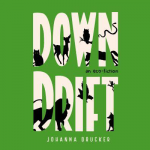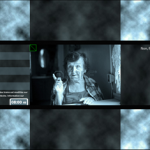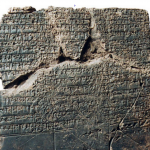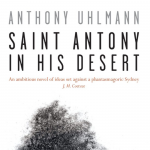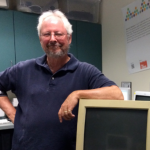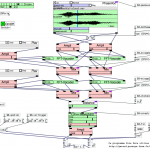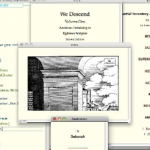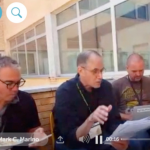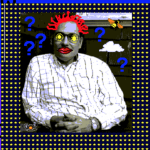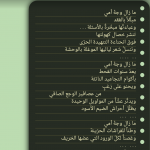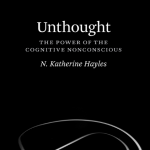2019
Bouchardon and Petit defend the concept of digital writing and the teaching thereof. We can accept that digital writing exists, with its specific properties and tensions, but can it be taught? Specifically, the pedagogical dimension of what is known as "digital" writing, the authors argue, would do well to follow a study on the relationship between writing and computer science that was sponsored by the Picardy region : PRECIP, PRatiques d'ÉCriture Interactive en Picardie (interactive writing practices in Picardy).
Exploring the interaction of poetics and language with the discourse of the Anthropocene (through etymologies of various ecological ages, or notions of the “survival of the fittest” and embodiment), Retallack combines poetry and prose to occasionally suspend the essay genre into a reflective and creative endeavour, attempting to encompass the larger cultural efforts of “poets, scientists, philosophers, visual and performance artists, composers of every kind [who are] working on an interconnected project” of ecopoetics.
This reprinted essay, first published in Angela Hume and Gillian Osborne's edited collection Ecopoetics: Essays in the Field (Iowa UP, 2018), addresses the major themes of – and suggests the possibility of a vital conversation between – two forthcoming ebr gatherings: 'Essayism', edited by Jason Childs and Joseph Tabbi, and 'Natural Media', edited by Lisa Swanstrom and Eric Dean Rasmussen. Image: Ship of Fools in Flames, c. 1450; possibly Jheronimus Bosch.
Clarke opens with a biographical account of his own early encounters with the Gaia concept - and a skepticism he shared with the evolutionary thinker Lynn Margulis, Gaia's second author after the British scientist James Lovelock. Neither an organism nor a single cell, and not really an organic or vitalistic entity, Gaia is better understood, according to Margulis, as "an emergent property of interaction among organisms, the spherical planet on which they reside, and an energy source, the sun." The move away from metaphors and New Age vitalisms tethers Gaia theory more tightly to the sciences. Margulis’s work brings Gaia in line with the autopoietic systems theory of Humberto Maturana and Francisco Varela introduced in the 1970s.
This essay is drawn from a preliminary version of several sections from Clarke’s forthcoming book presently entitled Partial Earth: Lynn Margulis, Systems Theory, and the Evolution of Gaia (Fall 2020) and appears here by permission of the University of Minnesota Press.
A book-review meditation-musing by David (Jhave) Johnston on a multimodal science fiction by Johanna Drucker. The story is told from the point of view of a distributed organism, Archaea that was discovered in the 1970s. "Structurally similar to bacteria but chemically-distinct," this entity suggests what a born-digital literature for the posthuman era might look like: "an epoch when human-level consciousness drifts down into animals, insects, fish" and many other others.
This is an informal essay, not a paper. There are simply too many questions and few answers. The text was assembled from notes from my keynote conference at ELO 2018 in Montreal ("Mind the Gap!"), where I have experimented with a tentative form of performing theory, possibly pushing the limits of Walter Benjamin's desire to write a book made of quotations only. Also, as with all things, this is an incomplete account of the use of humor and constraint in electronic literature. Many examples just simply could not be included here, and it is not my intention to perform close-readings of any of these works either. My goal is simply to create a narrative that signals how humor is related to constraint in art and technology. Perhaps we can prepare an Anthology of Humorous Electronic Literature together? Also, some disambiguation is in order: this is not about computational humor, or the use of computers in humor research, or about jokes concerning computers. And this is also not about OuLiPo or other literary works specifically written under constraint.[footnote]For a discussion about these type of works, read ebr's thread "Writing Under Constraint," edited by Joseph Tabbi at the turn of the millennium. https://electronicbookreview.com/essay/writing-under-constraint/[/footnote]
Are digital practices ever going to transform what it means to create, circulate, read and preserve literary works? Bouchardon sets out ten ways that might happen.
What is the role of hand-crafted literary interfaces in a world of memes and bots? Kathi Inman Berens examines five recent books that address literary interfaces and applies pressure to the definition of "third generation electronic literature," exploring the role of code and intention in e-lit authorship.
Like e-books and so much else in digital commerce, the poetry printed out by Instagram give us back the book - stripping away the social features such as reader comments, nested conversations and responses that make a work "viral," or "spreadable." The content of Instagram poetry, to nobody's surprise, is almost always simplistic, inspirational, and emotional. What it spreads. like any other social media, is indistinguishable from from the surveillance infrastructure of digital metadata that allows algorithms to "read" the reader (who is left in the dark). Kathi Inman Berens in this essay puts forward some ways to change that.
For Martin Eve, Anthony Uhlmann appears to be writing for a very small audience: "those who are interested in contemporary mutations in metafiction, autofiction, and post-postmodern sensibilities."
A roundtable discussion hosted by Karl Knausgaard's Alma Mater in Bergen, Norway.
Does literature have a place in a world of ubiquitous computing, massive user bases, and even larger audiences? It might, Flores suggests, but first we must redefine (and differently historicize) literary arts in ways that are not constricted by the print paradigm.
Here we transcribe an extended conversation between hypertext author Bill Bly and Ph.D. candidate Brian Davis that began in January 2018 at the Maryland Institute for Technology in the Humanities (MITH), home to The Bill Bly Collection of Electronic Literature. They discuss Bly's long-term electronic hypertext project, We Descend, Archives Pertaining to Egderus Scriptor (1997-present), as well as the history of electronic hypertext and hypertext theory, the technological challenges of born digital writing and archiving, book-archives and archival poetics, and the value of innovative writing and deep reading amidst the current century's "hodgepodge," "higgledy-piggledy" social media.
Through performances and readings configured across multiple screens, Phillippe Bootz conveys practices of constrained writing (and interrupted reading) into multiply mediated poetic dimensions.
Between the manifesto and the treatise, the text and the paratext, the theoretical and the poetic, the aphoristic and the systematic: Manuel Portela situates the "expressive richness" of Johanna Drucker's "General Theory," and its critique of present social and political formations.
A consideration of Monstrous Weather, a recent netprov (or networked improvisation) and the ways that collaborative storytelling encourages the rereading, retelling, rewriting, and adaptation of stories that begin as performances, and then turn into a form of archiving through still further rereading, rewriting and retelling. Author Alex Mitchell begins by depicting how, during the original performance of Monstrous Weather, there was a constant reworking, remixing and retelling of texts, both literally and through references and embellishments. This process gradually coalesced the loose collection of story fragments into something that had a kind of coherence, if not as a story, then at least as a storyworld. Mitchell discuss two particular performances/remixes: a live reading of excerpts from the netprov performed at the Electronic Literature Organization (ELO) Conference 2017 almost exactly 1 year after the initial performance, and a subsequent hypertext remix/archive.
An Mosaic for Convergence, Charles Bernstein's hypertext essay from ebr Issue 6 in the Winter of 1997-1998, explores the ramifications of a literature that is not structurally challenged, but structurally challenging. By then, Bernstein could sense a shift in literary sensibility, where it was beginning "to seem as natural to think of composing screen by screen rather than page by page." That was a few years after the flourishing of hypertext, but before the internet made reproduction of our print corpus a dominant practice (as e-books, primarily, with very little print/screen interplay or reader/author/programmer interchange). The moment Bernstein describes, and its instantiation on ebr's Alt-X legacy site, seems to the ebr editors something worth preserving - if only as a measure of recognized literary possibilities that have not been realized.
Bernstein's essay is the first of many that will be recovered by ebr co-editor Will Luers, and re-produced in the journal's version 7.0 (circa 2018-2019).
Rettberg's and Jackson's interview, and their creative work's direct engagement with environments anticipate the themes in a forthcoming ebr gathering by Eric Rasmussen and Lisa Swanstrom, titled Natural Media. More than just an articulation of environmental 'issues,' the creative work of Jackson and Rettberg actively integrates snowfall in Brooklyn, tattooed skin on bodies, pollutants in Jersey City and New Orleans (post-2012), and other particles and particulars that are touched by natural and medial ecologies.
This conversation is published as the fourth in a series of texts centered around the publication of The Metainterface by Søren Pold and Christian Ulrik Andersen. Other essays in the series include: The Metainterface of the Clouds, Always Inside, Always Enfolded into The Metainterface: A Roundtable Discussion. and Voices from Troubled Shores: Toxi•City: a Climate Change Narrative.
Babak Elahi shows how electronic literature in its public display, its interactivity, and its paradoxical combination of ephemerality and permanence brings us closer to the ancients than to the moderns - and closer still to the collective ritual experiences that Arabic and Muslim literature always valued over Western individualism. Further still, the emergence of Arabic e-lit does not just mean inclusions of still more cultural or ethnic identities. The politics of identity is yet another Western concern that an online Arabic poetics is happy to leave behind.
2018
Cognition, as we've known for quite some time, is much larger than consciousness. And that realization can help explain literature's longtime, productive fascination with the unconscious. But today, when a scholar such as N. Katherine Hayles connects "nonconscious cognition to a wide range of technical, financial, and literary issues," we are set to fundamentally rethink the "nature and value of the humanities today."



